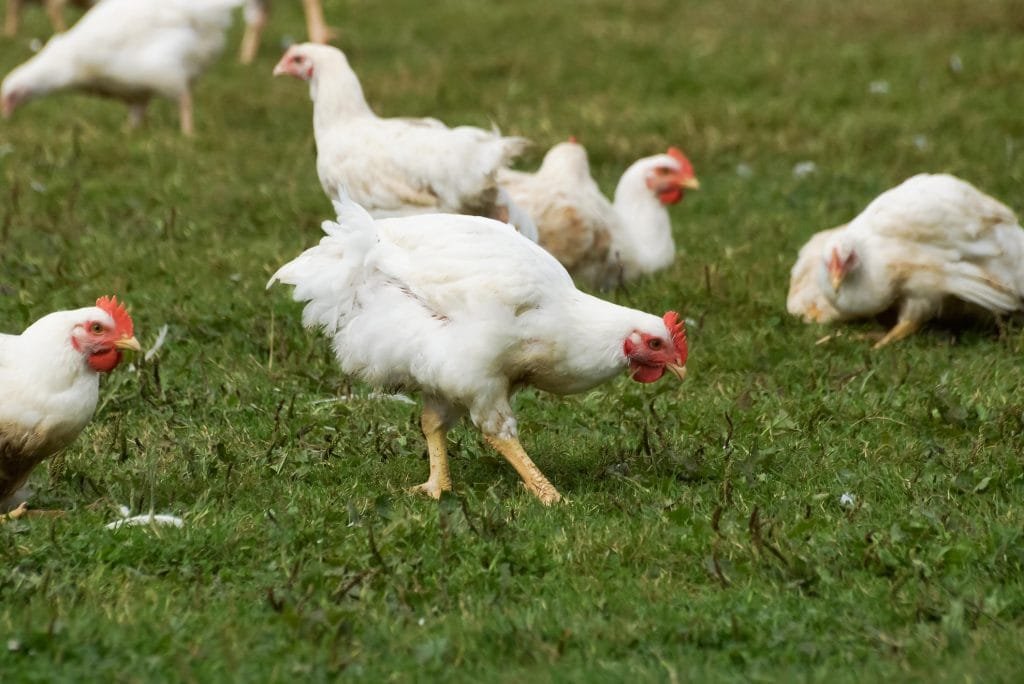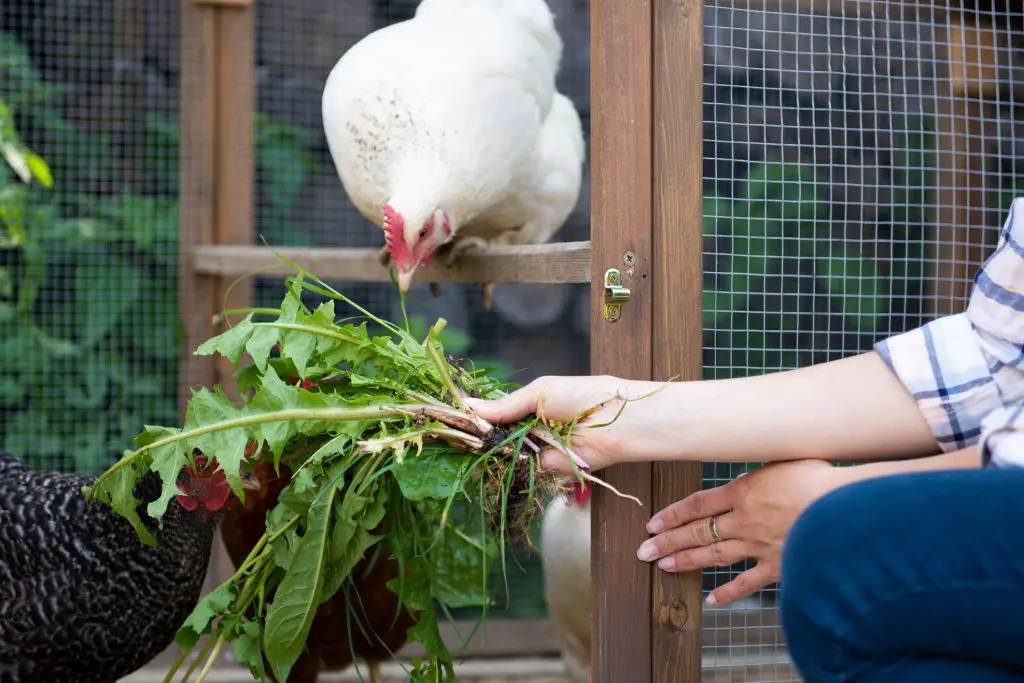This post contains affiliate links.
Allowing chickens to explore outside results in happier, healthier chickens and brighter yolk eggs, so making the decision to free-range your chickens is a win-win situation. Keeping chickens in a free-range situation can significantly reduce your feed costs as they can supplement their feed ration and actively search for tasty titbits themselves.
Free-ranging chickens are able to supplement their diets by foraging, which will reduce the amount of chicken feed that they require. However, the basis of their diet must be a balanced poultry mash, pellet, or crumble, which should be supplemented with fruit, vegetables, and other healthy food.
Keeping your poultry healthy and happy has a lot to do with what they eat and available space. Free-ranging your chickens will ensure that they have enough space, so let’s look at what they must be fed so your birds stay healthy and happy.

What Should Free Range Chickens Be Fed?
Any discussion regarding balanced chicken nutrition should take into account that chickens are omnivores. This means that they have evolved to eat a varied diet and to stay healthy – you will be surprised at the assortment of things your chickens will find to snack on while roaming about in the backyard.
Free-ranging your chickens will cut down on your feed bill significantly. They will be able to naturally supplement their chicken feed with insects, seeds, and vegetation that they forage for outside. However, even when it is mid-summer, it is never a good idea to stop feeding your chickens.
Chickens will actively search and forage for extras outside, no matter how much feed you provide in the coop. It is natural chicken behavior to be constantly scratching and investigating their surroundings. This is part of what makes keeping chickens so entertaining.
Chickens miss nothing and try to eat anything they can snatch in their beaks. Frogs, lizards, mice, grubs, insects, seeds, vegetation – everything is on the menu. So you might be wondering why you still need to feed them if they can forage on their own.
For optimal growth and to be successful layers, all poultry needs to get a consistently balanced source of nutrients. Simply free-ranging them with no extra feeding would result in a feast or famine situation where there might be enough in some seasons, but the chickens might become stressed and underweight at other times. This will negatively affect their egg-laying ability and strain their overall health. Learn more in my article, Can Chickens Live On Just Grass?
Free-range chickens don’t often become overweight. If they are out and about all day, they will enjoy their regular feeds, but they also receive a lot of exercise foraging. Many poultry owners feed their chickens twice a day – once when they let them out of their coop and again when they return in the evening.
As with any animal chickens have ideal body weight, they can become too skinny or too fat. Learn all about these two weight issues in chickens in my articles Can Chickens get fat? How to help them lose weight and What To Do If Your Chickens Are Skinny.
When and how often you decide to provide the daily balanced poultry feed will depend on your daily schedule. It is a good idea to feed at a regular time to reduce the stress on your chickens. They will quickly learn the routine. Some free-range chicken owners have no-mess feeders available to their hens throughout the day.

Food For Free Range Chickens
Let’s go through what you should feed your free-range chickens to keep them in peak condition. Remember that the form of the balanced feed you need to offer them should be based on their age. Small chicks will need fine mash feed, while crumble or pellets can be used for bigger chickens.
You might get a little confused when you go into the feed store and are faced with multiple bags of different types of chicken food, so let’s break it down to know exactly what to provide for your free-range chickens.
Chickens go through distinct phases in their lives. The basic daily ration you need to provide will depend on their age.
This table explains the various forms of poultry feed to help you know what you should provide as basic day-to-day for your free-range flock.
| Type of Chicken Food | Age | What Is It? |
| Starter – comes in mash or crumble form | Chicks younger than 8 weeks | Starter is a high protein feed that will support rapid growth and development. It can be medicated or non-medicated to prevent coccidiosis |
| Grower – usually comes in a mash or crumble form | Pullets and cockerels that are older than 8 weeks but not yet adult. | Grower has a lower protein content than Starter. The calcium level is still fairly low because the hens have not yet started laying. Grower can be medicated or non-medicated. |
| Layer – comes in mash, crumble, or pellets | Point of lay or adult hens. Hens start laying at around 20 weeks of age, but this varies depending on the breed of your chickens. | Layer feed provides your hens with a complete feed that will support and maintain their health so that they can produce eggsThe calcium content of layer feeds is much higher than other feeds. Layer feed is not usually medicated. |
| Grain and pellet mix | Adult chickens | This is a complete feed that is a combination of pellets and grains. It tends to be more expensive than other types of feed. Grain and pellet feed might not be worth the added expense if your chickens are free-range. |
| Scratch – this is a mixture of grains and seeds. Scratch is available in various textures from superfine to whole seeds | Depending on the size of the seeds, it can be offered to any age group. | Take note that scratch is not a complete feed. It is a supplemental feed and does not contain any added vitamins or minerals. Scratch is one of the least expensive feeds, and chickens love it. It should not be used exclusively because chickens require a complete chicken feed. |
If you have a mixture of chicks with adult birds, you can provide a tray of finer grower chick feed with a handful of pellets or crumble slightly apart from where the other adult birds are fed. Mother hens can be quite feisty and protective of their chicks, so allowing them to eat a short distance away is safer for everyone.
A word of caution. Do not be tempted to feed layer mash to young chicks. Although it is similar in appearance, it has a very high calcium content which is too high for growing chicks and may cause growth problems.
Adult laying hens should be provided with at least half a cup of feed per day if free-ranging. This will ensure that they receive the protein and calcium required to lay healthy eggs.
- ORGANIC: Certified USDA Organic for fresh, organic eggs.
- NON-GMO: These complete pellets are crafted with non-gmo ingredients.
- EGG PRODUCTION: Manna Pro Layer Pellets are crafted with 16% protein to support optimal...
If you have a lot of chickens, try not to feed them at a single point. This is because chickens have a strict pecking order, and the more dominant hens will intimidate those lower down in the group.
Besides a staple chicken feed which should be the basis of any chicken’s diet, you can provide supplemental items like fruit, vegetables, mealworms, or even leftover food like rice, pasta, and bits of meat. Even if your chickens are free-ranging, providing them with extras is essential, especially during bad weather or in winter.
Food items that must be avoided are table scraps that contain high amounts of salt or oil. Citrus, onions, avocado, green potatoes, and rhubarb should never be fed to chickens.
Besides feeding your free-range chickens a balanced and varied diet, don’t forget to provide a constant supply of fresh, clean water. If you are concerned about how much water your chickens are drinking, check out my article Can a Chicken Drink Too Much Water? This is just as important during the cold winter months as during the heat of summer, so if temperatures fall below freezing in your area, take measures to ensure that the water bowls do not freeze over.
Final Thoughts
Free-range chickens can forage for supplemental feed, but a good quality balanced chicken food must form the basis of their daily diet. The type of chicken feed that you choose must be based on the age of the birds. Chickens should also be provided with a variety of fruit and vegetables. They can also be offered table scraps so long as they are not high in salt or contain excessive oil.

